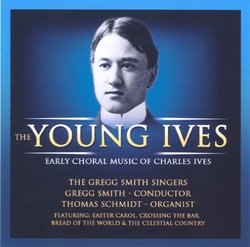The Early "Soft" Music of Charles Ives
Chris Speaks | Winston-Salem, NC | 12/09/2009
(5 out of 5 stars)
"In his 'Descriptive Catalogue of the Music of Charles Ives,' James Sinclair, reputed Ives scholar and Executive Editor of the Charles Ives Society, lists Gregg Smith and his singers as the first documented premiere performers of Ives' choral music. Several of these premieres appear on "Charles Ives: Music for Chorus," (1966) "New Music of Charles Ives: Seventeen First Recordings," (1970) and certain performances appearing on "Charles Ives: The 100th Anniversary," (1974) and rank among the cream of the crop; however, all three of these titles can only be found on LP. While it is possible to find a smattering of Ives' choral music salt-and-peppered throughout other recordings on CD, there remains a noticeable shortage of discs dedicated exclusively to these Ives' choral music. This disc alone, by filling that particular gap, is a valuable treasure trove of history and fascinating music from Ives' pre-1902 ("soft") period.
Why "soft"? This, of course, was the term Ives himself used to describe his early music, music which, when compared to his later, more mature years, was less dynamic, expressed greater influence of European composers of the day, and generally (in his opinion, at least) weak. In that sense, each of the pieces featured here feels more self-conscious and tempered by the rich patronesses who Ives came to despise later in life; however, that doesn't mean the works featured here, five of which ("Lord God, Thy Sea Is Mighty"; "I Come to Thee"; "All-Forgiving, Look On Me"; "Bread of the World"; and "Benedictus in E") have been recorded commercially for the first time, are without merit. What all of the pieces on this disc exhibit is that young Ives was every bit the master of composition and performance that biographies make him out to be, and that's no small matter!
For instance, "Turn Ye, Turn Ye," possibly written and initially performed when Ives was only 16 years old, displays great control of an over-arching lyricism that should have astounded the residents of his hometown of Danbury, CT when performed in the local church. As the second stanza begins, young Ives demonstrates one of the first "Ivesian" moments in his music, the result of all the profound sound experiments which his father impressed upon him as a boy, such as singing in one key while playing in another. While it's not as ground-breaking or pioneering as any of his later explorations with sound, it definitely serves as an intriguing reference point for the beginning of what would, in time, become defining and monumental.
Smith, a longtime advocate of Ives' choral music, and his new generation of singers execute these works with great precision. The first nine tracks of this disc were recorded anew at Saint Peter's Church in New York City during February 2003 to March 2004. The effectiveness and expressiveness of each of these pieces is brought out with great clarity by the singers. "Crossing the Bar" (a liturgical adaption of the poem by Alfred, Lord Tennyson), "I Come to Thee," and "All-Forgiving, Look On Me" are abundantly compelling. Of particular interest to Ivesians will be the experimental piece "Processional: Let There Be Light," written in 1901, which harkens back to Ives' more unconventional psalm settings while also foreshadowing the great things to come. Fiercely dissonant and powerful, this piece is truly representative of the young Ives attempting to find his own unique musical voice.
The hands down treasure of this disc is the recording of "The Celestial Country," originally recorded at St. Paul's Chapel in New York City during two days in March 1972, and was originally featured on the 5-LP set entitled "Charles Ives: The 100th Anniversary" (1974). This early piece was to be considered by young Ives his magnum opus. Soon after its performance in 1902, Ives "retired" from the world of music, dedicating his efforts to excelling in the insurance industry. The Gregg Smith Singers do this piece great justice without being overtly sentimental or understated as other performances seem to do, and given that many Ives enthusiasts have been requesting the re-release of this phenomenal performance, owning this disc simply for this performance alone is worth every cent.
Even if there wasn't a dearth of discs containing Ives' choral music, anything Ives that Gregg Smith touches is sure to be golden given his history with the repertoire. Smith and his singers navigate comfortably through the early Ivesian idioms with grace and dexterity, emphasizing just the right qualities of each piece's uniqueness - a uniqueness which develops progressively as Ives himself developed as a composer and musician..
Strongly recommended.
"


 Track Listings (16) - Disc #1
Track Listings (16) - Disc #1